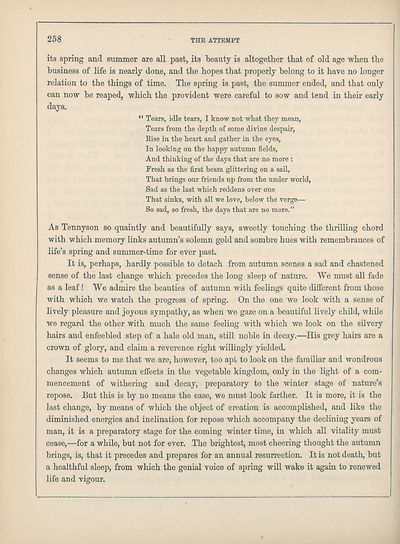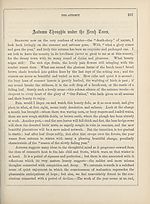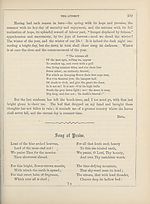Attempt > Volume 1 and Select writings
(270) Page 258
Download files
Complete book:
Individual page:
Thumbnail gallery: Grid view | List view

258
THE ATTEMPT
its spring and summer are all past, its beauty is altogether that of old age when the
business of life is nearly done, and the hopes that properly belong to it have no longer
relation to the things of time. The spring is past, the summer ended, and that only
can now be reaped, which the provident were careful to sow and tend in their early
days.
“ Tears, idle tears, I know not what they mean,
Tears from the depth of some divine despair,
Else in the heart and gather in the eyes,
In looking on the happy autumn fields,
And thinking of the days that are no more :
Fresh as the first beam glittering on a sail,
That brings our friends up from the under world,
Sad as the last which reddens over one
That sinks, with all we love, below the verge—
So sad, so fresh, the days that are no more.”
As Tennyson so quaintly and beautifully says, sweetly touching the thrilling chord
with which memory links autumn’s solemn gold and sombre hues with remembrances of
life’s spring and summer-time for ever past.
It is, perhaps, hardly possible to detach from autumn scenes a sad and chastened
sense of the last change which precedes the long sleep of nature. We must all fade
as a leaf! We admire the beauties of autumn with feelings quite different from those
with which we watch the progress of spring. On the one we look with a sense of
lively pleasure and joyous sympathy, as when we gaze on a beautiful lively child, while
we regard the other with much the same feeling with which we look on the silvery
hairs and enfeebled step of a hale old man, still noble in decay.—His grey hairs are a
crown of glory, and claim a reverence right willingly yielded.
It seems to me that we are, however, too apt to look on the familiar and wondrous
changes which autumn effects in the vegetable kingdom, only in the light of a com¬
mencement of withering and decay, preparatory to the winter stage of nature’s
repose. But this is by no means the case, we must look farther. It is more, it is the
last change, by means of which the object of creation is accomplished, and like the
diminished energies and inclination for repose which accompany the declining years of
man, it is a preparatory stage for the coming winter time, in which all vitality must
cease,—for a while, but not for ever. The brightest, most cheering thought the autumn
brings, is, that it precedes and prepares for an annual resurrection. It is not death, but
a healthful sleep, from which the genial voice of spring will wake it again to renewed
life and vigour.
THE ATTEMPT
its spring and summer are all past, its beauty is altogether that of old age when the
business of life is nearly done, and the hopes that properly belong to it have no longer
relation to the things of time. The spring is past, the summer ended, and that only
can now be reaped, which the provident were careful to sow and tend in their early
days.
“ Tears, idle tears, I know not what they mean,
Tears from the depth of some divine despair,
Else in the heart and gather in the eyes,
In looking on the happy autumn fields,
And thinking of the days that are no more :
Fresh as the first beam glittering on a sail,
That brings our friends up from the under world,
Sad as the last which reddens over one
That sinks, with all we love, below the verge—
So sad, so fresh, the days that are no more.”
As Tennyson so quaintly and beautifully says, sweetly touching the thrilling chord
with which memory links autumn’s solemn gold and sombre hues with remembrances of
life’s spring and summer-time for ever past.
It is, perhaps, hardly possible to detach from autumn scenes a sad and chastened
sense of the last change which precedes the long sleep of nature. We must all fade
as a leaf! We admire the beauties of autumn with feelings quite different from those
with which we watch the progress of spring. On the one we look with a sense of
lively pleasure and joyous sympathy, as when we gaze on a beautiful lively child, while
we regard the other with much the same feeling with which we look on the silvery
hairs and enfeebled step of a hale old man, still noble in decay.—His grey hairs are a
crown of glory, and claim a reverence right willingly yielded.
It seems to me that we are, however, too apt to look on the familiar and wondrous
changes which autumn effects in the vegetable kingdom, only in the light of a com¬
mencement of withering and decay, preparatory to the winter stage of nature’s
repose. But this is by no means the case, we must look farther. It is more, it is the
last change, by means of which the object of creation is accomplished, and like the
diminished energies and inclination for repose which accompany the declining years of
man, it is a preparatory stage for the coming winter time, in which all vitality must
cease,—for a while, but not for ever. The brightest, most cheering thought the autumn
brings, is, that it precedes and prepares for an annual resurrection. It is not death, but
a healthful sleep, from which the genial voice of spring will wake it again to renewed
life and vigour.
Set display mode to: Large image | Transcription
Images and transcriptions on this page, including medium image downloads, may be used under the Creative Commons Attribution 4.0 International Licence unless otherwise stated. ![]()
| Ladies' Edinburgh Debating Society publications > Attempt > Volume 1 and Select writings > (270) Page 258 |
|---|
| Permanent URL | https://digital.nls.uk/109868194 |
|---|
| Attribution and copyright: |
|
|---|

